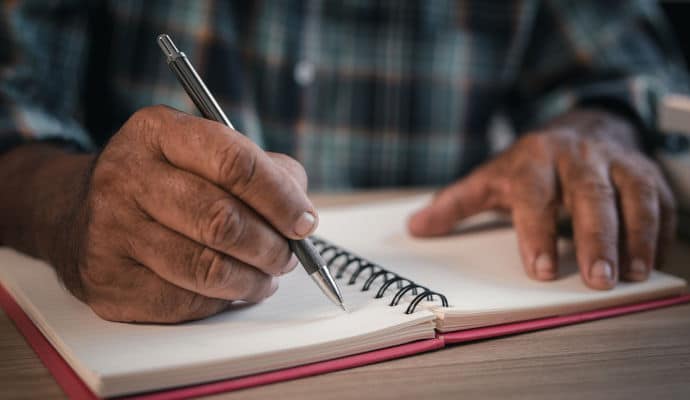Caring for a loved one with dementia can feel overwhelming, but keeping a dedicated dementia journal can help you stay organized, spot patterns, and reduce daily stress. By tracking key details such as mood fluctuations and medication responses, you'll create a valuable record that enhances communication with doctors, identifies triggers, and makes caregiving more manageable.
In this article, we share seven essential things to document that will help you provide better care while preserving your well-being.

Keeping a Dementia Journal Helps You Stay Organized
Caring for someone with Alzheimer’s disease or dementia can feel like riding a rollercoaster.
When symptoms and problems seem random and uncontrollable, caregiving becomes very stressful.
But having accurate information and being able to find patterns or triggers helps you feel more in control and less stressed.
You’ll also be better equipped to solve problematic behaviors or health problems.
This is why a dementia journal is a key caregiving tool.
Writing quick notes throughout the day in a dedicated journal means that you’ll have accurate information about what happens and when it happens.
Any note-keeping method will do – a simple notebook, a binder with some lined paper, on your computer or smartphone, or whatever works best for you.
Plus, having notes makes it easier to share important information with doctors, family, and other caregivers.
We outline seven key things to track in a dementia journal and share real-life examples of how this can help solve problems and make caregiving easier.
7 Things to Track in a Dementia Journal
1. Dementia symptoms and care needs
Tracking new or existing dementia symptoms helps you see the bigger picture and reduce worry from uncertainty.
Jotting notes about the level of confusion, behaviors, or ability to do everyday tasks helps you know if your older adult’s cognitive function is declining or staying the same.
It also provides insight into the severity and frequency of symptoms, helping you determine the type of support they require regularly.
For example, your notes could indicate that they require assistance with meals, but can shower and dress independently.
Or, your notes might reveal that they need a lot more care than you thought – they’re quite disoriented and regularly need help with all tasks of daily living.
Sometimes, the amount of care can add up slowly, so you don’t even realize how many additional responsibilities you’ve taken on since you started caregiving.
Taking notes helps us recognize when care needs are increasing, so we’ll know when we need to ask family for help, hire assistance, or find volunteers and other resources.
2. Challenging behaviors like anger, anxiety, and hallucinations
Challenging behaviors are especially stressful when they seem to happen at random.
But sometimes, you can find patterns or solutions by taking notes about what happened, when it happened, and what happened before or after.
For example, after taking notes for a week, you realize that your mom’s anger at a particular time of day could be caused by being hungry, thirsty, and a little tired.
The next day, you try an experiment. About an hour before her usual outburst, you give her a small snack, encourage her to drink some water, and then encourage her to use the toilet.
After having those physical needs met, she looks more relaxed, is in a better mood, gets interested in a fun activity, and doesn’t have an angry outburst.
Because of the dementia, she didn’t realize she had those needs or know how to ask for what she needed.
Taking notes and looking for patterns and possible triggers helped you identify what could be causing the problem and test a potential solution.
3. Eating and nutrition habits
Eating habits can change when someone has dementia.
If you’re concerned that your older adult isn’t getting good nutrition, it may help to track what they’re eating, when they’re more or less interested in food, and what foods they seem to like or dislike.
Those notes help you determine what types of food to offer at various times of day.
Plus, they also tell you how much your older adult is eating.
Maybe they only eat small amounts, so you worry that they’re not getting enough. However, the notes indicate that they consume six good-sized, nutritious snacks throughout the day.
Seeing the facts helps you worry less about nutrition and gives you the information you need to take action.
Tracking the amount of liquids your older adult drinks is similar.
If you’re worried they’re dehydrated or that a certain amount of fluids is needed for a medication to be effective, take notes on how much they drink and which beverages they prefer.
VIDEO: Keeping a Dementia Caregiving Journal
4. Toileting and incontinence issues
People with dementia typically become incontinent at some point.
If it becomes a concern and the doctor has no suggestions, use the dementia journal to help your older adult maintain a regular toileting schedule.
And if there are accidents, your notes could help you determine if something triggered them and if it’s something that could be modified.
For example, you may notice that if you encourage your older adult to use the toilet every 2 hours, there are no problems. However, going to the bathroom every 3 hours can sometimes cause an accident.
Now you know that the ideal time for bathroom breaks is every 2 hours.
Or, your notes might reveal that certain foods or beverages are more likely to cause an accident so you remove them from their regular diet.
5. Safety issues
Safety can become a big issue when someone has dementia.
One symptom is not knowing what a particular object is or what it’s used for.
So they may think that cleaning fluid is a sports drink or that shaving cream should be used to brush teeth.
They could also get confused when handling sharp objects like knives, razors, or scissors, and seriously injure themselves.
It’s a fine line to walk between keeping someone safe and letting them be as independent as possible, especially in the earlier stages.
It can be tough to know when it’s necessary to put safety locks on the stove or lock away all sharp objects.
Tracking behavior and symptoms over time helps you identify when they’re making certain types of mistakes and provides hints as to when greater supervision or additional safety measures are needed.
6. Medication effectiveness and side effects
With medication, a notebook is an essential tool.
Writing things down helps you determine if a medication is working effectively or if there are side effects that a doctor needs to be aware of as soon as possible.
Taking notes about symptoms and changes in behavior is especially helpful when your older adult starts a new medication, you’re suspicious that an existing medication is causing problems, or there’s a change in the medication dose or timing.
If there are any problems, you’ll be able to give the doctor the details they need to improve the situation.
7. Information for medical appointments
Keeping a dementia notebook also makes doctor visits more productive.
When you’re concerned about specific issues, your notes will include the information the doctor needs to provide practical help.
Without those accurate details, they might need to ask you to go home, observe the behavior for two weeks, take notes, and return for another visit.
Symptoms that doctors typically ask caregivers to track include falls, sleep problems, pain, fatigue, and incontinence.
They’ll usually want to know how often it happens, how severe it is, if there seems to be any trigger or pattern, and anything unusual.
When you prepare for a doctor’s appointment, review your dementia journal to identify the concerns that have been troubling you.
Put them into one list of questions and concerns. Then, choose your top 3 questions or concerns and bring the entire list and the journal with you.
At the appointment, take notes on what the doctor says. This gives an accurate record of the issues discussed and the doctor’s specific instructions.
There’s often so much covered during an appointment that it’s tough to remember it accurately in your head.
Final Thoughts About Using a Dementia Journal
Starting a dementia journal is a small investment of time that pays enormous dividends in clarity and calm. It transforms the overwhelming task of remembering every detail into a simple, organized practice, freeing up your mental energy to be more present with your loved one.
This journal is more than just a notepad; it's your personal command center for caregiving, a tool for advocacy, and a record of your shared journey. Don't feel pressured to track everything at once. Start with just one or two items that feel most pressing.
By giving yourself this structured outlet, you're not just managing symptoms—you're reclaiming a sense of control and creating a compassionate roadmap for the path ahead.
Recommended for you:
- 3 Stages of Dementia: What to Expect as the Disease Progresses
- 7 Ways to Reduce and Manage Mean Dementia Behavior
- 12 Best Alzheimer’s and Dementia Books for Caregivers
About the Author

Connie is the founder of DailyCaring.com and was a hands-on caregiver for her grandmother for 20 years. (Grandma made it to 101 years old!) She knows how challenging, overwhelming, and all-consuming caring for an older adult can be. She also understands the importance of support, especially in the form of practical solutions, valuable resources, and self-care tips.














Do you have daily worksheets for caregivers to hand off to the next caregiver so that everyone is on the same page for what happened throughout the day?
This article might have the sheets you’re looking for – A Caregiver Notebook Makes Caregiving Easier https://dailycaring.com/a-caregiver-notebook-template-makes-caregiving-easier/
This is of course a great idea. But we have searched in vain for an app we can use so that both of us can record in one place they sort of information described in the article. A paper journal is very last century and very unlikely to be where we need it when we need it. It’s also not easily shareable. But our phones are always in our pockets. If you know of an app either designed for this purpose or that can be used in this way, please, please publish that information!
Absolutely, an app helps keep important info and contact information conveniently at hand. We’re currently working on a round up of the top caregiving apps.
A possibility is to set up a shared spreadsheet in Google Drive that you can both access on your cell phones for quick entries. If you have a standard shorthand/initials notation, it can be quite quick to do and lets you sort by various criteria to see possible patterns.
Behavior Notes:
Date Time Who Location Category Info Type Description
Who=Who made this note item?
Category=Interaction, Environmental, Situational, Care event, Mood,
Other
Info Type (from Daily Caring article)=symptom, care need, behavior, eating, toileting, safety, medication, info for Dr.
Great suggestion, thanks!
Hello. I keep notes in my calendar. Good day, bad day, what made it bad.
Simple notes that can be referenced easily.
Good luck!!
Love this! Thank you for your thoughts Ute!
As a retired Mental health nurse who has worked with people with varying types of problems, I thought the points you mentioned about the preparation needed when accompanying a person ‘s visit.
We’re so glad our suggestions are helpful.
My mother is 83 and our family has been back and fourth trying to do the right thing for her care. It’s been horrific dealing with this disease. These tips have been so helpful. I read anything and everything on this subject. We are getting into the worst of it now. I would love to understand how and why this decease works . What’s happening in her brain.
This is certainly a tough situation, I’m so sorry 🙁 It’s great that you’re educating yourself on dementia, that will definitely help in making decisions, dealing with day-to-day challenges, and making things a little easier. Here are some articles that you may find useful:
— 3 Stages of Dementia https://dailycaring.com/3-stages-of-dementia-what-to-expect/
— 6 Must-Read Alzheimer’s Books for Caregivers https://dailycaring.com/6-must-read-alzheimers-books-for-caregivers/